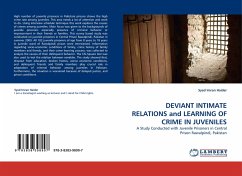
DEVIANT INTIMATE RELATIONS and LEARNING OF CRIME IN JUVENILES
A Study Conducted with Juvenile Prisoners in Central Prison Rawalpindi, Pakistan
Versandkostenfrei!
Versandfertig in 6-10 Tagen
32,99 €
inkl. MwSt.

PAYBACK Punkte
16 °P sammeln!
High number of juvenile prisoners in Pakistani prisons shows the high crime rate among juveniles. This area needs a lot of attention and work to do. Using interview schedule technique this work explores the causes of crimes among juveniles. Main focus was given to the backgrounds of juvenile prisoners especially presence of criminal behavior or imprisonment in their friends or families. This survey based study was conducted on juvenile prisoners in Central Prison Rawalpindi, Pakistan in summer 2009. All 102 juvenile prisoners of age from 8 years to 18 years in juvenile ward of Rawalpindi priso...
High number of juvenile prisoners in Pakistani prisons shows the high crime rate among juveniles. This area needs a lot of attention and work to do. Using interview schedule technique this work explores the causes of crimes among juveniles. Main focus was given to the backgrounds of juvenile prisoners especially presence of criminal behavior or imprisonment in their friends or families. This survey based study was conducted on juvenile prisoners in Central Prison Rawalpindi, Pakistan in summer 2009. All 102 juvenile prisoners of age from 8 years to 18 years in juvenile ward of Rawalpindi prison were interviewed. Information regarding socio-economic conditions of family, crime history of family members and friends, and their crime learning process, was collected to analyze the causes of their delinquent behavior. The Chi-Square test was also used to test the relation between variables. The study showed that, dropout from education, broken homes, worse economic conditions, and delinquent friends and family members play crucial role in adaptation of criminal behavior among juveniles in Pakistan. Furthermore, the situation is worsened because of delayed justice, and prison conditions.












